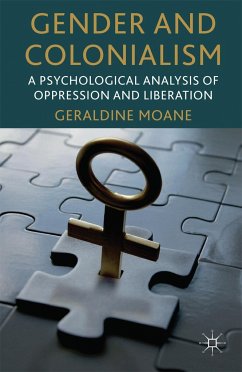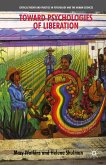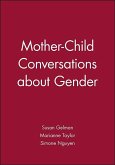Drawing on the writings of diverse authors, including Jean Baker Miller, Bell Hooks, Mary Daly, Frantz Fanon, Paulo Freire and Ignacio Martin-Baro, as well as on women's experiences, this book aims to develop a 'liberation psychology'; which would aid in transforming the damaging psychological patterns associated with oppression and taking action to bring about social change. The book makes systematic links between social conditions and psychological patterns, and identifies processes such as building strengths, cultivating creativity, and developing solidarity.
'Highly recommended for upper-division undergraduates through professionals, this book contains an excellent, extensive bibliography that will provide the advanced student or scholar with numerous resources for in-depth analysis of many important contemporary issues.' - G.M. Greenberg, Choice
'Gender and Colonialism provides an excellent overview of liberation psychology from a feminist perspective. In the fashion of a Psychological Bulletin article - extended to book format - it gives a meaningfully organized, well-written, systematic and creative summary of the literature in this research domain.' - T. Teo, Theory and Psychology
'It is a wide-ranging reference text, excellent for teaching purposes.' - M. McDermott, Women's Studies International Forum
'Moane's book makes a significant contribution to a necessary discussion of oppression and liberation in psychology.'
- S. Austin, Feminism and Psychology
'Moane's book will appeal to a wide audience ..her book is thus both practical and visionary.' - B. Bayer, Irish Journal of Feminist Studies
'This is an outstanding contribution to the field of liberation psychology. Moane leads the way in integrating psychological, cultural, and political oppression. She links personal emancipation with collective liberation in theroretical and practical ways. I urge all psychologists and individuals committed to promoting well-being with justice to read this book. Like the first edition, this volume is rich in scholarship and inspiration.' - Isaac Prilleltensky, Erwin and Barbara Mautner Chair in Community Well-Being and Dean, School of Education, University of Miami, USA
'In 1999 Geraldine Moane presented a book that was ahead of its time in the sense that it was introducing not only the idea of liberation as it was being developed in psychology, but also showing how it could be applied. Now Moane, in this new version of that work, is including the advances created around the world, during the past ten years. The readers will find an ample revision of the current situation of liberation within psychology, connecting it, as before, with the theory and practice of feminism and with the colonialism critique, whose processes and practices are analysed. Particularly interesting is the way the author generates a praxis (practice producing theory; theory giving way to practice), showing how engaged work with oppressed and excluded groups can be carried out; something especially useful for practitioners and researchers. Thus, the reader will also find in this book not only up-to-date information about the psychology of liberation, but about the levels of change (personal, interpersonal and political), produced in the application of psychology with a liberating orientation, along with a discussion about the transformations happening in both individuals and society.' - Dr Maritza Montero, Universidad Central de Venezuela, South America
'Drawing on community, critical, peace, human rights, and gay-lesbian psychologies as framed by liberation and feminist struggles the author demonstrates the dialectic of personal and structural transformations as they have been envisioned and engaged through political struggle. The Irish experience that grounds this deeply theoretical analysis makes this book a rare and important contribution to liberation and feminist psychologies from the English speaking world.' - Professor M. Brinton Lykes, Boston College Lynch School of Education, USA
'Gender and Colonialism provides an excellent overview of liberation psychology from a feminist perspective. In the fashion of a Psychological Bulletin article - extended to book format - it gives a meaningfully organized, well-written, systematic and creative summary of the literature in this research domain.' - T. Teo, Theory and Psychology
'It is a wide-ranging reference text, excellent for teaching purposes.' - M. McDermott, Women's Studies International Forum
'Moane's book makes a significant contribution to a necessary discussion of oppression and liberation in psychology.'
- S. Austin, Feminism and Psychology
'Moane's book will appeal to a wide audience ..her book is thus both practical and visionary.' - B. Bayer, Irish Journal of Feminist Studies
'This is an outstanding contribution to the field of liberation psychology. Moane leads the way in integrating psychological, cultural, and political oppression. She links personal emancipation with collective liberation in theroretical and practical ways. I urge all psychologists and individuals committed to promoting well-being with justice to read this book. Like the first edition, this volume is rich in scholarship and inspiration.' - Isaac Prilleltensky, Erwin and Barbara Mautner Chair in Community Well-Being and Dean, School of Education, University of Miami, USA
'In 1999 Geraldine Moane presented a book that was ahead of its time in the sense that it was introducing not only the idea of liberation as it was being developed in psychology, but also showing how it could be applied. Now Moane, in this new version of that work, is including the advances created around the world, during the past ten years. The readers will find an ample revision of the current situation of liberation within psychology, connecting it, as before, with the theory and practice of feminism and with the colonialism critique, whose processes and practices are analysed. Particularly interesting is the way the author generates a praxis (practice producing theory; theory giving way to practice), showing how engaged work with oppressed and excluded groups can be carried out; something especially useful for practitioners and researchers. Thus, the reader will also find in this book not only up-to-date information about the psychology of liberation, but about the levels of change (personal, interpersonal and political), produced in the application of psychology with a liberating orientation, along with a discussion about the transformations happening in both individuals and society.' - Dr Maritza Montero, Universidad Central de Venezuela, South America
'Drawing on community, critical, peace, human rights, and gay-lesbian psychologies as framed by liberation and feminist struggles the author demonstrates the dialectic of personal and structural transformations as they have been envisioned and engaged through political struggle. The Irish experience that grounds this deeply theoretical analysis makes this book a rare and important contribution to liberation and feminist psychologies from the English speaking world.' - Professor M. Brinton Lykes, Boston College Lynch School of Education, USA









